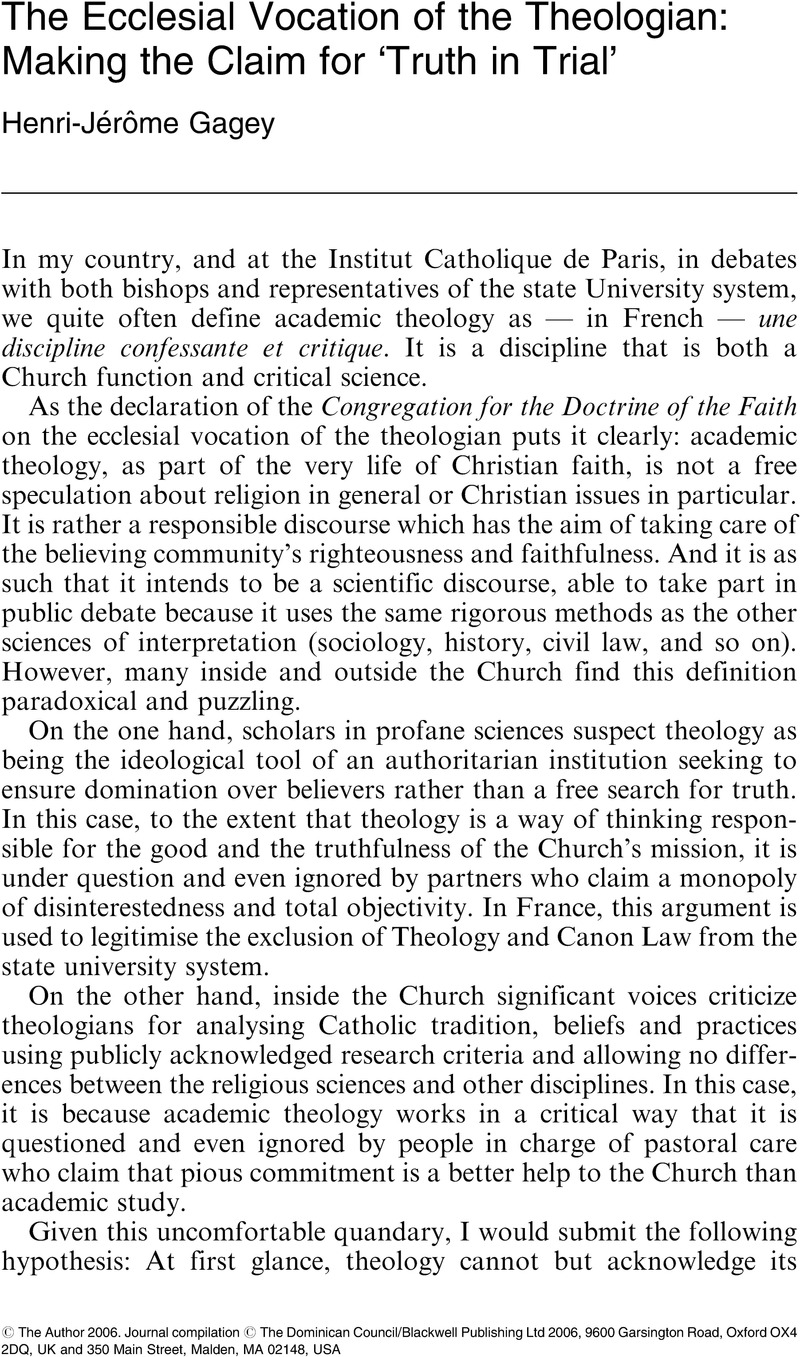No CrossRef data available.
Article contents
The Ecclesial Vocation of the Theologian: Making the Claim for ‘Truth in Trial’
Published online by Cambridge University Press: 01 January 2024
Abstract

- Type
- Original Articles
- Information
- Copyright
- © The Author 2006. Journal compilation © The Dominican Council/Blackwell Publishing Ltd 2006, 9600 Garsington Road, Oxford OX4 2DQ, UK and 350 Main Street, Malden, MA 02148, USA
References
1 Fifteen years ago it was the topic of my doctoral dissertation, Jésus dans la théologie de Bultmann, Desclée collection “Jésus/Jésus Christ”, Paris 1993Google Scholar, which I explored further in diverse papers. For instance, see “La théologie aux prises avec l’historiographie” in collaboration with Jean-Louis Souletic, Recherches de Science Religieuse (83/4) 1995, pp. 557–583; “Il est ressuscité, il n’est pas ici”, Le cas Jésus Christ, Pierre Gibert et Christoph Theobald (eds), Bayard Paris, 2002, pp. 323–352; “Le consensus christologique issu de la ‘deuxième quéte”, Transversalités, Revue de l’Institut Catholique de Paris(86) avril–juin 2003, pp. 1–17Google Scholar.
2 Schriftauslegung im Widerstreit. Zur Frage nach Grundlagen und Weg der Exegese heute, Quaestiones Disputatae 117, Herder, Freiburg, Basel, Wien, 1989.
3 By the way, the same question can be addressed to Milbank's understanding of how to relate theology and secular social theories.
4 Take an example. Scholars of the Religionsgeschichteschule, particularly W Bousset, held that the opposition between Hellenism and Judaism was the key point which made the New Testament and the history of primitive Christianity intelligible. On this basis they thought they could distinguish Palestinian apocalyptic Christianity, globally centred on waiting for the Son of Man, and a Hellenistic Christianity that confessed Jesus as the heavenly Lord, the Κυριος Παντοκρατορ. In the latter case, Jesus was no longer the object of expectant waiting, but was worshipped as the raised Lord whose Spirit plunged the community into an ecstatic experience. Hence follows the commonplace that the dogmatisation of Christian beliefs, already attested to in the New Testament, is but the result of a hellenisation of the primitive Palestinian tradition. Consequently faithfulness to the original Gospel of the Kingdom preached by Jesus requires a de-dogmatisation, that is a de-hellenisation, of the Christian scriptures. But, with the passing of time, more accurate knowledge of the linguistic and archaeological data weakened these sharp and quite devastating affirmations of the pioneers. The thesis of the hellenisation of early Christianity vanished when it became clear that the Christological concepts of the New Testament are rooted principally in a Christian re-reading of what can be designated as Old Testament Christology. Put briefly, the Christology of the incarnation of the Word, the theology of the Eucharistic memorial, and so on, were much more rooted in Jewish theology than in esoteric Hellenistic traditions.
5 The idea that Jesus’ preaching and behaviour implies a Christology is paramount to the “second quest”. It appears first in Bultmann's paper published in 1929, “Église et Enseignement dans le Nouveau Testament”, Foi et Compréhension I, pp. 173–210, see p. 193. See also p. 229, and Theologie des Neuen Testaments, J C B Mohr, Tübingen, p. 44.
6 “Zur Frage: Wer ist Jesus?” in J Gnilka (ed), Neues Testament un d Kirche, Herder, Freiburg-Basel-Wien, p. 368.
7 L’Heure de l’Église, Fayard, Paris, 1982, p. 60.
8 ‘With unparalleled authority, Jesus was able to go both beyond the text of the Torah and the authority of Moses. … This sovereignty shook the foundations of late Judaism. …’, E Käsemann, Essais Exégétiques, Delachaux et Niestlé, Neuchâtel, 1972, p. 167.
9 “In speaking of the ‘trial of Jesus’ we do not mean his trial in the narrow sense before the Sanhedrin or before Pilate, but the struggle for the truth of God in which he came forward as a witness; while from the other point of view, it refers to the ‘trial about Jesus’ in the judgment of God in which his witnesses speak up on his behalf. The expression moves from one significance to another, but this makes it more fertile. Behind its use lies the view that history is better understood in the categories of a legal trial and of a struggle for righteousness, life and freedom, than in naturalistic categories”, J Moltmann, The Crucified God, SCM, London, 1974, p. 113f.
10 Mame Paris, 1969, p. 31f.
11 Recherches de Science Religieuse, I, 1919, p. 241–259, 444–475.
12 In Joh., c.6, 1.4, n.7; c.15, 1.5, n.5.
13 See Walter Kasper, Dogme et Évangile, p. 42.
14 Paulinischen Perspektiven, Mohr, Tübigen, 1968, p. 177.
15 See William C Placher, Unapologetic Theology, John Knox Press, Westminster, 1989, pp. 24–35.
16 Theology and Social Theory, beyond Secular Reason, Blackwell, Oxford, 1990, p. 328.
17 Ibid., p. 330.
18 De Doctrina Christiana, I, 36–41, 44.




